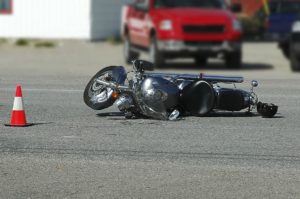Perhaps no other vehicle in the world represents that spirit of freedom in such a way as the motorcycle. From hot-rod sportbikes to choppers with ape-hanger handlebars, the motorcycle captures the imagination of open roads, high speed, and a culture of people cut from a different cloth than all the rest.
Riders know that being involved in a motorcycle accident is often an eventuality and not just a possibility. If you are lucky, your accident won’t be serious, and your leathers and helmet will protect you, leaving you with nothing more than a tale to tell. Many motorcyclists aren’t so lucky.
If you are in a motorcycle accident, you might wonder how long the legal process will take. There is no simple answer because so many factors are involved.
Here is an overview of motorcycle accidents and how a skilled motorcycle accident lawyer can help you get compensation for this life-changing event.
Causes of motorcycle accidents

Motorcycles have the unique characteristic of being relatively light-weight vehicles that can accelerate quicker than most motor vehicles. Due to their mass and brake systems, they also decelerate quickly. As far as quickness and maneuverability go, you can’t beat a motorcycle. However, bikers are often at the mercy of cars and trucks sharing the road.
Here are some common causes of motorcycle wrecks.
- Visibility: other drivers are awful at paying attention to their surroundings. Motorcycles always lose when drivers don’t check their mirrors or blind spots.
- Road hazards: Objects on the road, such as blown-out truck tires, potholes, animals, and loose gravel, contribute to motorcycle wrecks.
- Drunk or impaired drivers: Drivers under the influence of substances have lower situational awareness than sober drivers. They might change lanes without looking or, worse yet, become fixated on the motorcyclist and veer into them.
- Inexperienced drivers: Driving experience hones the skills to share the road with others. In not becoming familiar with different types of vehicles on the road, new drivers or drivers lacking experience in these situations might not understand that they need to watch out for motorcycles in an active, defensive driving method.
- Distracted drivers: Whether someone is texting and driving or simply zoning out, they are putting other drivers at risk.
Motorcycle injuries
Physics plays a large part in motorcycle crashes and injuries. Thousands of pounds of car or truck colliding into a motorcycle at speed will result in an almost unimaginable force on a human body. Without crumple zones, airbags, or even the vehicle's structure absorbing the force of the impact, a few things will happen.
The brunt of the force goes through the soft tissue and even bones and skin of the rider. Helmets, leathers, and other protective gear can only do so much. As they say, you don't dress for the ride but the slide.
Road rash
In a collision, a best-case scenario would involve being ejected from the bike and dispersing a lot of that force through a controlled slide on protective leathers, with your helmet protecting your skull, eyes, and other vulnerable body parts. This isn’t usually the case, however. An object in motion will continue to be in action until an unbalanced force stops it.
The pavement, other vehicles, trees, and friction play a part in stopping your momentum. In the meantime, you have probably been beaten up pretty badly by the impact. And that is if you are covered head to toe in protective gear like a superbike racer. Many people don’t wear protective equipment and find that sliding across the asphalt burns through jeans, light jackets, and shoes very quickly causing road rash.
The abrasions you get from contact with the pavement at speed are painful and may even require skin grafts to heal. Motorcycle accidents give emergency room staff hours of picking gravel and dirt out of wounds and trying to limit infection by scrubbing dirt out of irritated skin with a surgical brush. Road rash can be very serious and lead to lasting injuries.
Heavy trauma and TBIs
A collision with a car or truck will result in broken bones, internal organ damage, and severe bruising. This is likely even with leathers and helmets. Helmets are crucial in protecting your most valuable asset from injury. Your brain is the most critical part of your central nervous system.
Traumatic brain injuries occur when your body comes to a sudden violent stop. Your brain sloshes back and forth inside your skull, resulting in bruising of brain matter, shearing of blood vessels and arteries, and even secondary injuries such as pressure and swelling, resulting from the blood filling a cavity with no active drainage system.
Effects on health and livelihood
Anyone who has experienced an injury in a motorcycle accident can tell you that the aftermath can takes months, if not years, to recover from.
Hospitalization
Severe injuries require emergency medical care, from setting bones, cleaning road rash and abrasions, and even procedures to relieve pressure from TBIs. You could be looking at an outpatient procedure from minor road rash to lengthy hospital stays due to multiple surgeries, observation, or even coma.
Unfortunately, motorcycle accidents result in higher fatalities than nearly all other motor vehicle accidents. The human body is pretty fragile compared to the steel and rubber of any car, bike, or truck, especially when moving at high speeds. Hospital stays are costly, and recovery is indeterminate for some injuries.
Loss of time at work
All that time in the hospital or recovering from your wreck means losing time at work. From mending bones to closed head injuries, you are looking at some significant time getting back to speed.
Some people might have life-changing injuries. Temporary and permanent disability only pays for so much. Hospitals are expensive, and bills, rent, and other obligations show no mercy about getting paid.
Rehabilitation
Recovering from a motorcycle accident could require extensive physical rehabilitation. In some cases, people have to relearn essential functions such as walking and lifting things—if they ever physically rehabilitate. Motorcycle accidents often result in paralysis or such diminished brain function that the victim becomes permanently disabled, having to relearn speech, reading, and other cognitive functions.
This may take years, and insurance companies willing to shut you up with a check would rather watch their bottom lines than honor their obligations to pay for your recovery. Pain, suffering, and post-traumatic stress may continue to haunt you for many years to come.
Legal impacts
Health and recovery are only one side of the coin when putting your life together again. A lot of effort in recovery will also go to legal matters such as dealing with insurance companies and pursuing compensation from the other party. Getting compensation is time-consuming, and at this point, hiring a skilled attorney can make the process manageable.
Insurance
Much of the lawsuit process will involve negotiating with insurance companies. Their motivation will be to save themselves money, which you have been dutifully paying every month as a way to protect yourself. Many insurance companies will try to find ways to avoid paying the total value of your claim and may even drag out the process to make you act out of desperation rather than with logic.
As the bills stack up and the insurance companies don't seem to be offering much other than a token amount, you might feel inclined to take what you can without realizing your recovery could require far more money.
A skilled attorney knows how to negotiate with insurance companies. They know a lot about insurance payouts and settlements that you probably don't. Working with an attorney will almost always result in a higher payout when settling with an insurance company. If they won't settle, or if the person who hurt you in the accident isn't insured, you can take the matter to court.
The court process

Court proceedings rarely end quickly. Several factors will affect how long your case will take, and they are often independent of the details of your case. Backlogged courts, full dockets, and judge shortages make for an overloaded court system.
A trial might not take place until long after you file suit. Settlements and arbitration shorten the process, whereas continuances and calling for a trial will no doubt lengthen it. Many of these factors are within your control to some degree.
Typically, the expense of your medical bills, repairs to a property, and even other liabilities (such as if the other driver was intoxicated or performing other illegal acts of negligence) go beyond a check from the insurance company. You seek retribution and recognition for what changed your life forever. Going to court is a way to seek justice and the compensation you deserve.
Your attorney will meet all of the deadlines to file complaints so the court will hear your case. Your attorney will use information about the crash gathered from eyewitnesses, law enforcement, and even your doctors to build an argument for you in court. During this time, you will have chances to mediate with your insurer(s) or the opposing party, and the process can end in settlement.
A settlement saves time and usually money, yet you still have quite a bit of control in the case. If the matter goes before a judge, however, the court decides the amount you recover.
The time involved
This works in your favor because it is highly likely that you will still be accruing debt from lengthy hospital stays and rehabilitation and may even find yourself dealing with a permanent disability. At the outset of a motorcycle accident hospitalization, it is impossible to determine just how long treatment will last or how expensive it will be.
Your attorney will have a better idea of what to expect, given the circumstances. They have a familiarity with the courts and a working knowledge of how to expedite the process if possible. Though the court requires you to comply with statutes of limitations, the true time limits really depend on the court's workload and how many cases it needs to try before yours. Discovery takes time, as does your recovery. Patience while working through the process will prove crucial for your fight.
An attorney can help you

The legal system is a complex and often confusing process to navigate. By hiring a skilled attorney familiar with motorcycle accidents, you can overcome the hurdles the insurance companies might be throwing your way to save a buck (at your expense).
Your attorney can work through the roadblocks of negotiation, and arbitration, and has the know-how to assemble expert witnesses and vet eyewitnesses for potential trials. A skilled attorney will fight to protect your rights and help you get back on your feet again.
